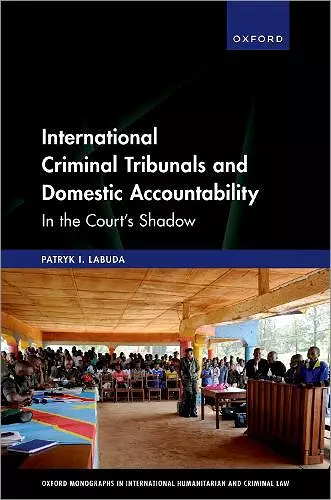International Criminal Tribunals and Domestic Accountability
In the Court's Shadow
Format:Hardback
Publisher:Oxford University Press
Published:16th Jun '23
Should be back in stock very soon

In the 1990s, the promise of justice for atrocity crimes was associated with the revival of international criminal tribunals (ICTs). More recently, however, there has been a renewed emphasis on domestic accountability for international crimes across the globe. In identifying a 'complementarity turn', a paradigm shift toward domestic accountability in the field of international criminal justice, this book investigates how the shadow of international criminal tribunals influences the treatment of serious crimes at the national level. Drawing on research and interviews in Rwanda, the Democratic Republic of Congo, and Sierra Leone, this book develops a tripartite framework to analyse how states and tribunals work with, despite, or against one another in the fight against impunity. While international prosecutors and judges use the principle of complementarity to foster cooperation and decrease tension with government actors, Patryk I. Labuda argues that too much deference by ICTs toward states reduces the likelihood of accountability and may enable national elites to consolidate authoritarian power. By interrogating how international accountability stakeholders relate to their domestic counterparts, International Criminal Tribunals and Domestic Accountability advocates improvements to ICTs' institutional design and more dynamic interactions with states to strengthen the enforcement of international criminal law.
Domestic prosecution of international crimes has become the mantra of international criminal law since the establishment of the International Criminal Court (ICC) in 2002. In International Criminal Tribunals and Domestic Accountability: In the Court's Shadow, Patryk Labuda expertly unpacks the assumption that international criminal tribunals such as the ICC catalyse domestic prosecutions. He deftly exposes the paradox of the increasing turn to domestic prosecutions of international crimes, which he argues may empower authoritarian elites, instead of providing meaningful accountability. Labuda's thoughtful book is a must read for anyone interested in the future of international criminal law. * Charles C Jalloh, Distinguished University Professor, Florida International University *
In offering both broad historical context and fine-grained case study illustration, Labuda expands our understanding of complementarity in both theory and practice. Whatever one's opinion about the appropriate relationship between the International Criminal Court and national judiciaries, this book is an eye-opening and essential read. * Kim Thuy Seelinger, Research Associate Professor, Brown School, Washington University Special Adviser on Sexual Violence in Conflict to the Prosecutor of the International Criminal Court *
Patryk Labuda's book is about light and shadows. Labuda encourages international legal institutions to step out of shadows of their own making; to stop overshadowing victims and domestic contexts; and to shade in colour rather than shroud things in their own image. Labuda's work is to law what Caravaggio's chiaroscuro is to the canvas- Labuda illuminates, places candles in the darkness, and reveals what is obscured. This excellent book offers wise counsel about how international criminal law enforcement can combat the increasingly illiberal swagger of our political times. * Mark A Drumbl, Class of 1975 Alumni Professor of Law and Director, Transnational Law Institute, Washington and Lee University *
This is a timely book that effectively analyses the turn to positive complementarity underpinned by a shift towards domestic accountability, as a response to the problematic interventions of international criminal tribunals. It assesses the relocation of the anti- impunity agenda closer to the locus of the crimes at the state level, and interrogates the important role that societal actors have to play in engaging national institutions in pursuing redress and accountability for atrocities. This is a superlative study that needs to be engaged with by analysts, policymakers, and practitioners of international criminal justice. * Tim Murithi, Head of Programme at Institute for Justice and Reconciliation, Cape Town, Author of Judicial Imperialism: The Politicisation of International Criminal Justice in Africa *
This thoughtful and perceptive examination of international criminal justice has been greatly enriched by Patryk Labuda's research on site, in the living laboratories of Africa. He examines the inexorable tension between national justice systems and the international mechanisms that is sometimes understood, at least as far as the International Criminal Court is concerned, applying the enigmatic notion of complementarity. This book will be of great value to practitioners as well as academics. * William A Schabas, Professor of International Law, Middlesex University *
There is simply too much to unpack-all of which I found rigorously presented, expertly analyzed, and persuasively argued. While much ink has been spilt on complementarity, positive complementarity, primacy, subsidiarity, and shadow, Labuda offers an original analytic framework. His methodological approach is as sound as his deductions are insightful...I unreservedly recommend International Criminal Tribunals and Domestic Accountability — In the Court's Shadow. * Michael G. Karnavas, International Criminal Law Blog *
- Winner of Winner, ABILA Book of the Year Award, American Branch of the International Law Association.
ISBN: 9780198868842
Dimensions: 240mm x 160mm x 20mm
Weight: 690g
368 pages